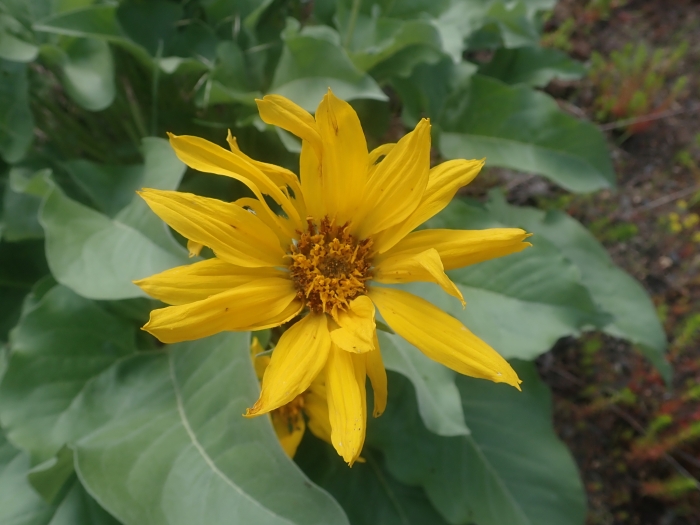Arrowleaf Balsamroot
(Balsamorhiza sagittata)
Arrowleaf Balsamroot (Balsamorhiza sagittata)
/
/

Nolan Exe
CC BY 4.0
Image By:
Nolan Exe
Recorded By:
Copyright:
CC BY 4.0
Copyright Notice:
Photo by: Nolan Exe | License Type: CC BY 4.0 | License URL: http://creativecommons.org/licenses/by/4.0/ | Rights Holder: Nolan Exe | Publisher: iNaturalist | Date Created: 2020-05-22T09:05:51-07:00 |























































Estimated Native Range
Summary
Balsamorhiza sagittata, commonly known as Arrowleaf Balsamroot, is a deciduous perennial herb native to dry open forests, grasslands, and prairies in the Western United States, as well as to the open, often rocky or sandy areas of British Columbia and Alberta. This plant typically grows to a height of 12 to 30 inches (30 to 76 centimeters) and spreads 12 to 24 inches (30 to 61 centimeters). It has a distinctive appearance with large, arrow-shaped basal leaves and tall flowering stems. The inflorescence bears one or more flower heads, each with a center of long yellowish tubular disc florets surrounded by a fringe of bright yellow ray florets, each up to 4 cm long, blooming from late spring to early summer. The flowers are showy and attract a variety of pollinators. The fruit is a hairless achene about 8 millimeters long. The plant’s deep taproot allows it to thrive in dry conditions, making it an excellent choice for xeriscaping.
Arrowleaf Balsamroot is valued for its bright, sunflower-like blooms and its ability to withstand drought, requiring minimal maintenance once established. It is often used in naturalistic plantings, restoration projects, and as an ornamental in water-wise gardens. It performs best in full sun to part shade and prefers well-drained soils. While it is generally pest-free, overwatering or poorly drained soils can lead to root rot. It is also important to note that while grazing animals find the plant palatable, it should not be overgrazed as this can reduce the plant’s vigor and flowering potential.CC BY-SA 4.0
Arrowleaf Balsamroot is valued for its bright, sunflower-like blooms and its ability to withstand drought, requiring minimal maintenance once established. It is often used in naturalistic plantings, restoration projects, and as an ornamental in water-wise gardens. It performs best in full sun to part shade and prefers well-drained soils. While it is generally pest-free, overwatering or poorly drained soils can lead to root rot. It is also important to note that while grazing animals find the plant palatable, it should not be overgrazed as this can reduce the plant’s vigor and flowering potential.CC BY-SA 4.0
Plant Description
- Plant Type: Herb
- Height: 1.5-2 feet
- Width: 1-1.5 feet
- Growth Rate: Moderate
- Flower Color: Yellow
- Flowering Season: Spring
- Leaf Retention: Deciduous
Growth Requirements
- Sun: Full Sun, Part Shade
- Water: Medium
- Drainage: Medium, Slow
Common Uses
Bee Garden, Edible*Disclaimer: Easyscape's listed plant edibility is for informational use. Always verify the safety and proper identification of any plant before consumption., Fire Resistant, Low Maintenance, Rock Garden, Showy Flowers
Natural Habitat
Dry open forests, grasslands, prairies, and open, often rocky or sandy areas in the Western United States, British Columbia, and Alberta
Other Names
Common Names: Arrow-Leaved Balsamrot, Oregon Sunflower
Scientific Names: , Balsamorhiza sagittata, Balsamorhiza helianthoides, Buphthalmum sagittatum, Espeletia helianthoides, Espeletia sagittata, Wyethia sagittata,
GBIF Accepted Name: Balsamorhiza sagittata (Pursh) Nutt.